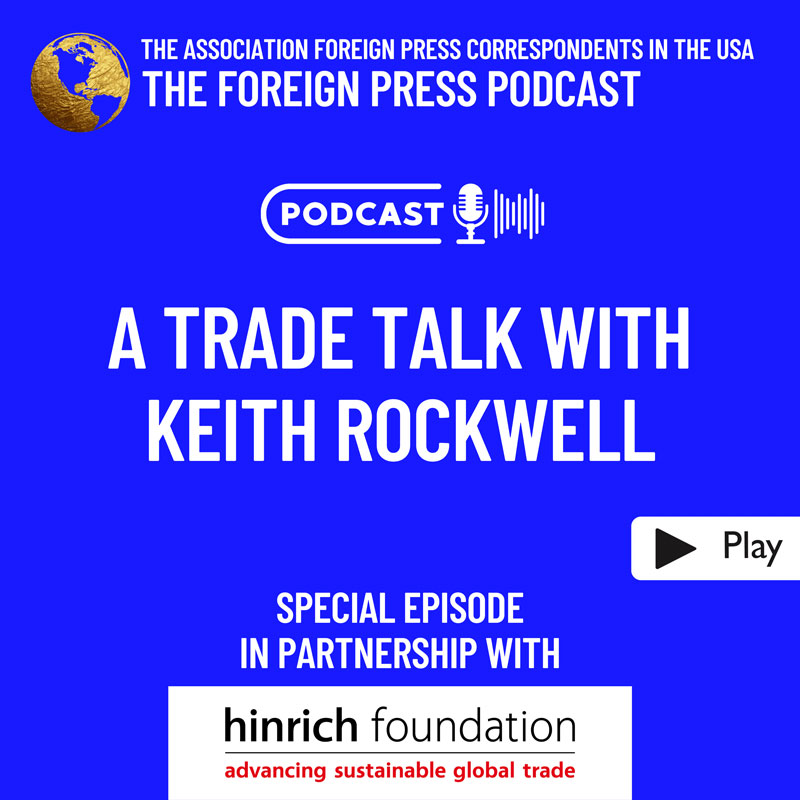Current Accounts: The Hinrich Foundation Trade Podcast
A trade talk with Keith Rockwell
Published 27 February 2024
In this special edition of Current Accounts, the Hinrich Foundation’s podcast on global trade, Patrícia Vasconcellos from the US Association of Foreign Press Correspondents and Keith Rockwell, former WTO director and Senior Research Fellow at the Hinrich Foundation, delve into the fast-changing landscape in global trade challenges.
Tune in to the special episode hosted by the Association of Foreign Press Correspondents in the United States here:
There is a notable shift in global trade patterns, particularly in case of the US. This is a result of deliberate decoupling initiatives spanning two successive US administrations, marked by tariffs on Chinese imports. The US-Mexico-Canada Agreement, sometimes characterized as NAFTA 2.0, emerges as a pivotal factor, fostering enhanced trade relations among the US, Mexico, and Canada. Proximity and integrated economies, as well as the challenges in global shipping routes, contribute to Mexico's increasing competitiveness in supply chains, especially in areas like electric vehicle (EV) production.
The Biden administration's trade policy alignment with its predecessor reflects a prevailing skeptisim towards trade. Prioritizing industrial and environmental policies, the administration has achieved significant legislative milestones, including the infrastructure bill, semiconductor bill, and the Inflation Reduction Act. That said, the convergence of trade and environmental policies, particularly in the context of EV production and domestic manufacturing requirements, poses a challenge in realizing the government's multifaceted policy objectives.
Moreover, the ongoing conflicts, such as those in Ukraine and the Middle East, continue to have physical and economic repercussions to global trade. The uncertainty surrounding the upcoming WTO ministerial meeting's ability to forge comprehensive agreements is heightened by challenges ranging from agricultural disputes to disagreements on e-commerce and tariff issues.
This special episode focuses on the dynamic shifts in global trade with guest Keith Rockwell, former WTO director and senior research fellow at the Hinrich Foundation. The insights from this episode paint a comprehensive picture of the complex and interconnected nature of current global trade dynamics, influenced by geopolitics, economics, and environment.
Here is an excerpt from their conversation:
|
Patrícia Vasconcellos: |
Is it accurate to say that this is also evidence? You already spoke a little bit about this, but is it accurate to say that this is evidence of how much global trade patterns have shifted? |
|
Keith Rockwell: |
Well, they are shifting. They are shifting. I don’t think they’re shifting as radically as some people have surmised, but they are shifting. I saw some polling from the US Chamber of Commerce in China. It said that 40% of companies were considering decreasing their operations in China. I think that no one talks about Mexico or Canada in that same way. It’s obviously politics. It plays a big role in this. Companies have also found that the atmosphere for operating in China has become far less hospitable. There’s all kinds of concerns about protection of intellectual property. There’s all kinds of concerns about government oversight. So people are very much of the view that their operations in China should be looked at and scrutinized very closely. Now, the Chinese leadership is aware of this. Xi Jinping has made an effort to try and reassure US businesses that their presence is welcome and that they should continue to invest and indeed increase their investments. But for the moment, this is being viewed with a degree of suspicion. |
Tune into the Hinrich Foundation’s podcast series for insights on international trade.
© The Hinrich Foundation. See our website Terms and conditions for our copyright and reprint policy. All statements of fact and the views, conclusions and recommendations expressed in this publication are the sole responsibility of the author(s).



